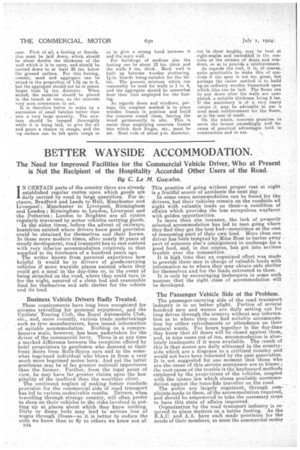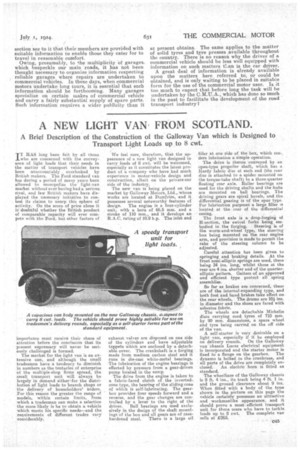BETTER WAYSIDE ACCOMMODATION.
Page 32

Page 33

If you've noticed an error in this article please click here to report it so we can fix it.
The Need for Improved Facilities for the Commercial Vehicle Driver, Who at Present is Not the Recipient of the Hospitality Accorded Other Users of the Road.
By C. Le M, Gosselm,
IN CERTAIN parts of the country there are already established regular routes upon which goods are daily carried by road in large quantities. For instance, Bradford and Leeds to Hull, Manchester and Liverpool ; Manchester to Liverpool, Birmingham and London ; Birmingham to London, Liverpool and the Potteries ; London to Brighton are all routes regularly traversed by motor vehicles carrying goods. In the olden times, before the advent of railways, hostelries existed where drivers knew good provision could be obtained for themselves and their horses. In these more modern times, after nearly 20 years of steady development, road transport has to rest content with very inferior accommodation relatively to that supplied to its forebears of a hundred years ago.
The writer knows from personal experience how helpful it would be to drivers of goods-carrying vehicles if more wayside places existed where they could get a meal in the day-time or, in the event of being stranded on the road, where they could turn in for the night, assured of a clean bed and reasonable food for themselves and safe shelter for the vehicle and its load.
Business Vehicle Drivers Badly Treated.
These requirements have long been recognized for persons travelling for personal enjoyment, and the Cyclists' Touring Club, the Royal Automobile Club, etc., and, more recently, various trade undertakings such as tyre manufacturers, have issued information of suitable accommodation. Nothing on Et comprehensive scale, however, has been undertaken for the driver of the commercial lorry. There is at any time a marked difference between the reception offered by hotel proprietors to gentlemen who descend at their front doors from Rolls-Royce cars and to the somewhat begrimed individual who blows in from a very much more begrimed motor lorry. And yet the latter gentleman may be of far greater national importance than the former. Further, from the legal point of view, he may have far greater claims upon the hospitality of the landlord than the wealthier client. The continued neglect of making better roadside provision for the commercial side of road transport has led to various undesirable results. Drivers, when travelling through strange country, will often prefer to sleep on their vehicles to the risks involved in putting up at places about which they know nothing. Dirty or damp beds may lead to serious loss of wages through illness—so it is better to endure the evils we know than to fly to others we know not of. c44 This practice of going without proper rest at night is a fruitful source of accidents the next day.
In some cases accommodation can be found for the drivers, but their vehicles remain on the roadside all night with valuable loads on thein—a condition of affairs which provides the less scrupulous wayfarer. with golden opportunities. In more than one instance the lack of properly selected accommodation has led to men going where they find they get the best bed—sometimes at the cost of consuming part of their own load. More than one driver has been tempted by Mine Host to barter away part of someone else's consignment in exchange for a good feed, and, in due course, has got into serious trouble over the .transaction.
It is high time that an organized effort was made to provide these men in charge of valuable loads with information as to where they may obtain safe shelter for themselvet and for the loads entrusted to them.
It is only by encouraging innkeepers in some such manner that the right class ef accommodation will he developed.
The Passenger Vehicle Side of the Problem.
The passenger-carrying side of the road transport industry is in no better plight. Parties of Several hundred men and women are daily setting out for long drives through the country without any information as to where they, can find suitable accommodation for either refreshments or attendance on their natural wants. For hours together in the day-time they know that all doors will be closed against them, and, in nine eases out of ten, accommodation is absolutely inadequate if it were available. The result of this is that scenes are daily witnessed in the countryside which are a disgrace to a civilized country and would not have been tolerated by the past generation. It is not suggested for one moment that those who are the cause of this serious annoyance are to blame ; the root cause of the trouble is the haphazard methods enTployed by the proprietors of the vehicles, coupled with the insane law which closes available accommodation against the bona-fide traveller on the road.
The police are largely cognizant, through complaints made to them, of the accommodation required, and should be empowered to take the necessary steps to have this state of affairs improved. Organization by the road transport industry is required to place matters on a better footing. As the R.A.C. and A.A. have each made provision for the needs of their members, so must the commercial motor section see to it that their memipers are provided with suitable information to enable those they cater for to travel in reasonable comfort.
Owing, presumably, to the multiplicity Of garages. which especkle our main roads, it has not been thought necessary to organize information respecting reliable garages where repairs are undertaken to commercial vehicles. In these days, when commercial motors undertake long tours, it is essential that such information should be forthcoming. Many garages specialize on certain makes of commercial vehicle and carry a fairly substantial supply of spare parts. Such information requires a wider publicity than it at present obtains. The same applies to the matter of solid tyres and tyre presses available throughout the country. There is no reason why the driver of a commercial vehicle should be less well equipped with information on such matters tan is the car driver.
A great deal of information is already available upon the matters here referred to, or could be obtained, and is only waiting to be placed in suitable form for the use of the commercial motor user. Is it too much to expect that before long the task will be undertaken by the C.M.U.A., which has done so much in the past to facilitate the development of the road transport industry?














































